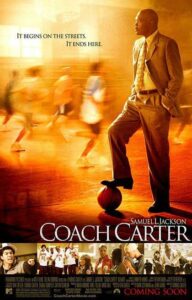03 Aug Coach Carter: What is your biggest fear?
One thing is certain: not all work teams are the same!
Blanchard & Hersey knew this well when they developed their work on Situational Leadership: Different Leadership Styles for Different Work Teams.
What is situational leadership?
It is a leadership style researched and developed by Kenneth Blanchard and Paul Hersey. The term refers to the idea that it is the leader, or manager, who must adjust his or her actions according to the maturity level of those who follow him or her.
Find out more on team coaching visiting our page HERE
Probably, however, their model did not refer to a particular group like the one featured in the following film.
Do you recognize this scene?
The most moving scene in the film is probably when the coach gets from one of his most rebellious students, whom he used to ask “What is your greatest fear?” this singular form of thanks:
The following is the text, taken from Marianne Williamson‘s poem, Our Deepest Fear, from Return to Love.
Our deepest fear is not that we are inadequate.
Our deepest fear is that we are powerful beyond measure.
It is our light, not our darkness
That most frightens us.We ask ourselves
Who am I to be brilliant, gorgeous, talented, fabulous?
Actually, who are you not to be?
You are a child of God.Your playing small
Does not serve the world.
There’s nothing enlightened about shrinking
So that other people won’t feel insecure around you.We are all meant to shine,
As children do.
We were born to make manifest
The glory of God that is within us.It’s not just in some of us;
It’s in everyone.And as we let our own light shine,
We unconsciously give other people permission to do the same.
As we’re liberated from our own fear,
Our presence automatically liberates others
What movie is the scene from?

This scene is taken from the film Coach Carter, inspired by the true story of coach Ken Carter (in the film played by Samuel L. Jackson). The film deals with the world of American school basketball as seen through the exploits of a principled coach. Coach Carter is yet another title whose main theme is the combination of sports/education, retracing all the must-sees of the genre in an extremely interesting and unique way.
Throughout the film, the Coach will be tasked with the tough job of gaining the respect of the members of the Richmond school basketball team, the one in which he himself took his first steps, and leading the team to victory. An inflexible educator, Carter will demand good scholastic results from his players, on pain of exclusion from the team, thus drawing the wrath of everyone, not only the students, but also teachers and parents: in short, an entire community with different ideas about what are the value choices and messages to be conveyed in terms of education and growth.
The film has been much discussed, as has the story of Coach Carter himself, especially because of the unorthodox methods that in some cases were used to make communication more effective.
So what message does this want to convey?
The values conveyed in this film are to be taken as a model for team leaders and team members alike. Sacrifice and work ethic are two key ingredients in this film: sacrificing for others and for oneself is the first thing that is taught to the players by the coach and it will actually bear fruit by making the team undefeated. But to this must be added the work done by the boys every day both in school and on the playing field. As in the film, then, these important themes can also come through in corporate settings and work teams. Let’s keep them in mind!
Find out more on communication visiting our page HERE
It may seem trivial to say that communication is the basis of all efficient teamwork, yet, although we always talk a lot about communication, we often take it for granted. It is important to keep in mind that in order to be functional it must be effective and consistent. The thing we need to learn is how to turn emotions into words. In matters such as that of communication, openness of mind and flexibility of thought is very important. Communicating effectively means making sure that the recipient correctly receives the message we want to transmit.

